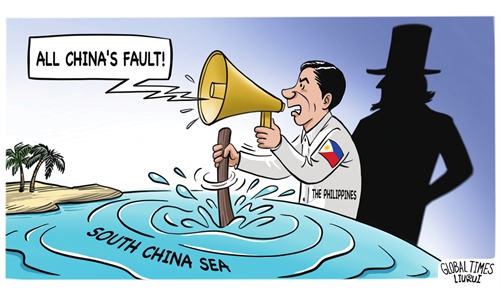
Illustration: Tang Tengfei/GT
Editor's Note:
"To manage disputes in South China Sea, the only viable option is negotiation," Ong Tee Keat (OTK), president of Malaysian think tank Belt and Road Initiative Caucus for Asia Pacific and former deputy speaker of the Lower House of the Malaysian Parliament, told Global Times (GT) reporter Li Aixin in an exclusive interview. OTK also raised concerns that inviting the president of the Philippines Ferdinand R. Marcos Jr to give a keynote address at the IISS Shangri-La Dialogue 2024 will not help in seeking dialogue and solutions.
GT: In a recent interview, you mentioned, "No military posturing and provocative language by any party at the behest of external powers should be allowed to distract, let alone disrupt, the overall symbiotic China-ASEAN partnership." Would you mind elaborating on this perspective?
OTK: ASEAN, as a regional bloc dedicated to promoting economic cooperation and regional peace, has its collective aspirations and concerns to prioritize. Under the prevailing non-interference principle, all member states share the understanding that domestic issues should be solved on their own without any outside intervention, and that each has sufficient state strength to handle these issues.
In this context, "Any form of military posturing and provocative language by any party at the behest of external powers" is certainly anathema to ASEAN's way to settle disputes by peaceful means, along with renunciation of the threat or use of force.
In the prevailing face-off between China and the Philippines, external powers are visibly involved and the target is the top trading partner of ASEAN. Any misjudgment or mishandling of the military stand-off on the high seas would invariably flare up the conflict, leaving the regional peace and partnership in tatters.
The external powers, notably the US, are not stakeholders involved in the dispute, thus having no locus standi in meddling in the case. Their sabre rattling in the disputed area is absolutely unnecessary, unconstructive and provocative in nature as it would only serve to up the ante in the dispute, rendering it more intractable.
GT: In recent years, the US has strengthened its ties with Japan and South Korea for security cooperation, enhanced its "Indo-Pacific Strategy," initiated AUKUS, promoted the Quad, and attempted to restructure Asian supply chains. How do you assess the security changes brought about by the US regional strategy in the Indo-Pacific region?
OTK: The deployment of troops and military presence in the vassalized allies of Washington under the various pacts were virtually devised to make the US feel safer in face of the purported "systemic challenge" posed by China. It's not a secret that the entire US-led security architecture is part of its "Indo-Pacific Strategy" targeting China, albeit on the pretext of serving the interest of Indo-Pacific security.
Parallel to this, the Supply Chain Agreement under the Indo-Pacific Economic Framework for Prosperity (IPEF) that claims to keep the Asia-Pacific supply chain resilient is visibly intended to exclude China from the entire supply chain. Yet, as of today, the only outcome brought to the table is the announcement on cobbling a crisis response mechanism in face of supply chain disruption, not a viable alternative that can deliver in times of crisis, thus leaving the entire mechanism porous and vulnerable.
All in all, the security changes brought about by the US regional strategy in the Indo-Pacific region are largely reactive in nature, primarily serving the interest of upholding its global primacy and hegemony in the region.
GT: What do you think is the most important approach to resolving disputes and tensions in the South China Sea?
OTK: Disputes and tensions in the South China Sea would remain intractable so long as the reigning hegemon insists on imposing its whims and fancies on the littoral states.
It's an overstatement that overlapping territorial claims have thrown the Freedom of Navigation through South China Sea into jeopardy. The self-proclaimed role of Washington in policing the Southeast Asian waters is absolutely unnecessary and irrelevant. It merely provides opportunities and justifications for the US fleet of naval warships to flex their military muscles at the doorstep of China.
On the issue of managing disputes, negotiation is the only viable option but it must strictly be confined to the stakeholders. As the claimant states' interests are diverse in different cases, any attempt to seek collective resolution for all cases of dispute is impractical. Even with the Code of Conduct in South China Sea in place, it's still no panacea to the issue as the merits and intricacies may vary from case to case. Henceforth, each and every negotiation should only involve the contending parties.
GT: President of the Philippines Ferdinand R. Marcos Jr. will give the keynote address at the IISS Shangri-La Dialogue 2024. What message do you think this arrangement conveys?
OTK: The arrangement for President Marcos Jr. to deliver the keynote address at the IISS Shangri-La Dialogue 2024 looks set to sensationalize the event. It appears that President Marcos Jr. might go hellbent to internationalize the issue, with blames heaped against China.
The option of seeking dialogue and solutions seems unlikely as this could have been done with sincerity below the radar watch.
The security dialogue, supposedly facilitating constructive dialogue on matters of security interests, may very likely be another round of geopolitical posturing cloaked in the outfit of military diplomacy.
GT: Do you think ASEAN countries have adequate mechanisms to manage security risks? What suggestions do you have in this regard?
OTK: All along, ASEAN has never been a military bloc. Its member states may have separate security pacts with others to address their respective conventional security concerns.
On the arising non-conventional security concerns like insecurities posed by climate change, food and energy crisis, to my knowledge, ASEAN has yet to have a collective mechanism to address.
In this regard, China's Global Security Initiative (GSI) may provide a good solution to fill the void. But in view of the security sensitivity in the region, Beijing may begin with minilateral engagement and cooperation with certain ASEAN member states on non-conventional security concerns.
GT: China has been promoting open, inclusive, transparent and equal regional security cooperation. However, Western media tend to portray China as a regional "bully." In your view, is China a force for peace in the region?
OTK: Portraying China as a regional "bully" is not a matter of unilateral interpretation per se, but rather an element of cognitive warfare on the part of the US, intending to influence the global optics with a negative perception of China.
In recent years, China's assertive territorial claims in the South China Sea and East China Sea, alongside the Taiwan Straits, have been deliberately framed as "Chinese aggressiveness" in the Asia Pacific. This makes an ideal wedge for the US to alienate the stakeholder countries in the region from China.
From the Chinese perspective, it's their legitimate right to defend their sovereignty that covers the renegade Taiwan province, Diaoyu Islands and the territorial waters within the bounds of nine-dash lines. To this end, any military manoeuvre within the Chinese territory and the disputed waters are being amplified and vilified as malicious.
Meanwhile, the sabre rattling of the warships dispatched by the US-led West are tactfully framed as "altruistic" moves to defend the freedom of navigation, thus giving the non-stakeholders from the West the moral high ground to condescend to others in the region.
Having been sandwiched in such a "discourse face-off," ASEAN member states are the first to bear the brunt. Trust deficit becomes the main concern. Against such a backdrop, Beijing may need to strike the right balance between the "charming offensive" underscored in the "neighborhood diplomacy" and the security manoeuvres underpinned by the imperatives in defending the state sovereignty.
From the Southeast Asian perspective, mixed messages conveyed or implied by any seemingly oxymoronic deeds are detrimental to building mutual trust and confidence across the region in the long run.
To "rebrand" the Chinese image in positive light, the negative portrayal of China as a "bully" must first be debunked, if not "crushed" strategically with creativity that resonates with the global aspirations at large, though China is still being disadvantaged in the turf of global discourse power as the international media continues to play mouthpiece for the West.
GT: May 31, 2024 marks the 50th anniversary of the establishment of diplomatic relations between China and Malaysia. Do you think the China-Malaysia relationship can serve as an inspiration for China-Philippines relations, as well as help address tensions in the South China Sea?
OTK: No single diplomatic relationship could ever be duplicated as the trajectories of any bilateral engagement remain diverse. In many instances, it varies with time and circumstances.
Nonetheless, the Malaysian model of seeking redress of territorial dispute by means of direct negotiation between the stakeholder nations serves as a viable template for others to emulate.
This must be done without any foreign interference in the spirit of the 1971 ZOPFAN Declaration (The Zone of Peace, Freedom and Neutrality) that underlines the collective intent of ASEAN to keep Southeast Asia "free from any form or manner of interference by outside Powers" and "broaden the areas of cooperation" through the creation of a Zone of Peace, Freedom and Neutrality.
GT: What suggestions do you have for China to win the hearts and minds of more audiences and listeners on platforms like the Shangri-La Dialogue?
OTK: Traditionally, platforms like Shangri-La Dialogue provide good avenues for multilateral engagements of military diplomacy. The US-led West takes it as a tool for discourse to propagate their security concerns and justify their military manoeuvres with their preponderance of semantics in military diplomacy.
Against such a challenging backdrop which is not short of China hawks, China can still convey its security concerns aloud with platitude-free semantics.
As the dialogue platform enables China to engage the world with its security take, the messages conveyed should therefore ideally be tailored more to suit the aspirations of the majority across the world.
In this context, China's savvy in engaging with the Global South, vis-a-vis the West, is a comparative edge to be harnessed as the developing world looks set to be more assertive on their long neglected aspirations over time in the evolving multi-polar world.
Over the past decade of BRI outreach, economically, China has successfully established its hold in the developing world, but not on security concerns.


